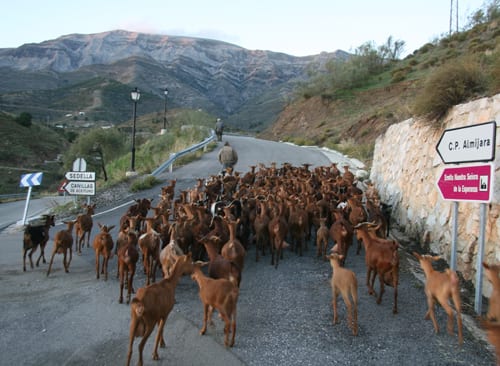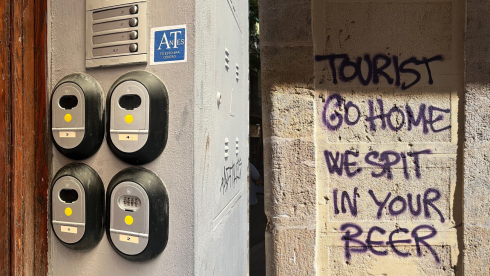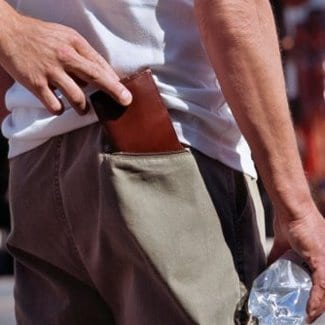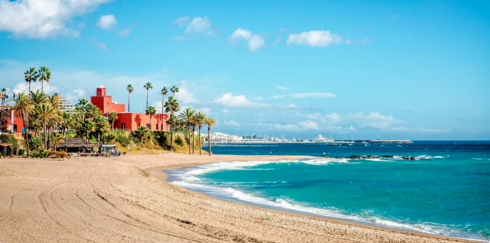By Ray Rowden
TRAFFIC jams around my village of Competa are not usually a problem. But you do need to look out for goats, who cause regular blockages in the lanes around the area.
They mostly come first thing in the morning or at dusk when the goatherds are bringing their flocks down from the high pastures above the village.
The locals know how to handle them, but the reaction from tourists is often hilarious, with some looking utterly terrified, while others jump out of their cars to take hasty photographs and, in turn, block the traffic flow from behind.
My next door neighbour is a goatherd, as it happens, the third in a generation and whose father still does his share of the work at the grand old age of 91.
It is an admirable pastime, and the real joy is receiving fresh goats milk in exchange for allowing their goats to graze the olive groves surrounding our home.
I moved to Competa from Sussex four years ago, having first visited the white village on holiday 30 years ago, when all of the land to the coast was agricultural and no motorway existed.
While things have certainly changed, on arriving as a resident I was struck by the way in which rural Spain still generally ticks along at quite a gentle pace.
In one local bar, for example, the farmers roll up on their donkeys or horses, tie them up outside, get plastered, and finally allow their steeds to take them home, often well after nightfall.
Competa is a lovely spot, clinging precariously to the mountains of the Almijara range, dominated by Maroma, one of the region’s highest peaks.
Once a key battle ground in the final struggle between the Moors and Christians over 600 years ago, it has a very historic feel.
The church, built in 1512, dominates the main plaza with an elegant tower added two centuries later.
The village centre has changed little over the centuries, with winding narrow streets and beautifully kept old houses, many with distinct Moorish influenced architecture. Roaming through the village streets is a great way to spend a day.
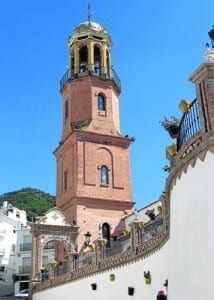
The village and surrounding countryside has a population of around 4,000, with the village itself remaining quintessentially Spanish, while the surrounding countryside is extremely popular with expats, who speak a total of 32 different languages.
It is a cosmopolitan place and becoming increasingly interesting for arts and music.
We have a local recording studio, a number of local flamenco stars living in the town and Competa buzzes with cultural activities of all kinds.
The Alberdini hotel boasts regular flamenco nights, using authentic local artists, while my own restaurant El Pilon offers monthly ballet and opera nights on a big screen during winter.
The Competa Amateur Performance Organisation put on regular events throughout the year, including ballet and dance gala performances, using local artists and some of the best dancers from London’s West End, variety shows and even an annual adult pantomime at Christmas, which is tinged with blue humour.
The village is also home to many painters and sculptors, who open up their studios for Competa Art Walkabout every May.
Competa also knows how to mark saints days and holidays, with magical candlelit processions, but highlight of the year is The Night of the Wine on August 15.
As a political advisor for the Labour Party in the UK, I have been fascinated by the local politics.
What is also so different here is that elections really matter as the locally-elected mayors have real power in their individual communities.
It also has little to do with one’s party allegiances, with many people voting for a candidate from a party very different from their beliefs. Our mayor Jose Luis Torres is in the PP party, but despite being a card-carrying member of the Labour Party I didn’t hesitate to vote for him.
He was previously the parish priest, who was persuaded to give up the priesthood in order to help the village that had been wracked with corruption for decades.
He has done loads for the village, giving it back its pride, by repairing its charming cobbled streets and sprucing up its many charming corners.
Even better, the first thing he did on assuming office was to take substantial pay cut.
He felt the economic crisis was hitting ordinary families and that he should share the burden.
He has since cleaned up affairs in the town hall and made it among Spain’s three ‘best run’, so no surprise he was re-elected last year with an increased majority.
Competa’s annual ‘blue’ panto is Aladdin this year, and will be running from November 29 to December 1 at the Museum

